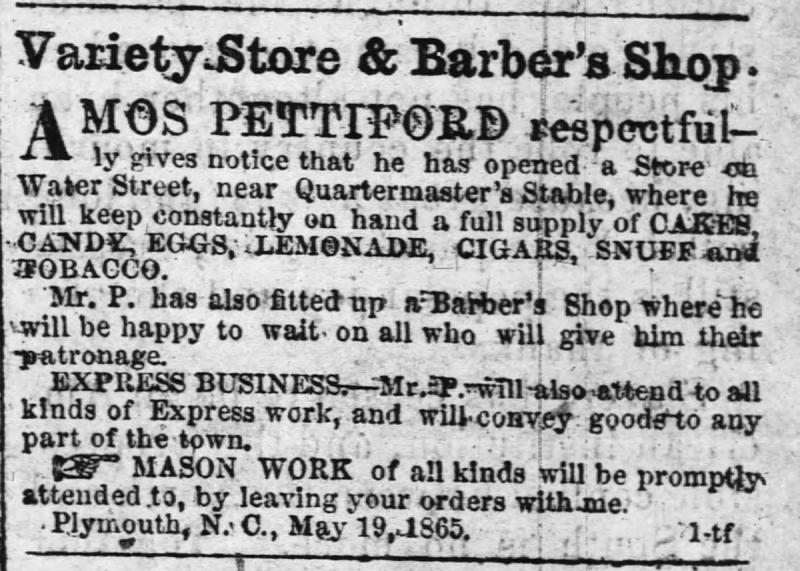"Variety Store & Barber Shop," The Old Flag
Advertisement that appeared in the May 19, 1865 edition of The Old Flag, a Plymouth, N.C. newspaper. These advertisements celebrate the return of peace — and of consumer goods from the North. With the end of the blockade, Southern merchants were once again able to import goods from the North and Europe. Transcription of advertisement below.

"[The Front Page]."The Old Flag, May 19, 1865. Available online courtesy at Newspapers.com and University of North Carolina at Chapel Hill. https://universityofnorthcarolinaatchapelhill-newspapers-com.libproxy.li....
AMOS PETTIFORD respectfully gives notice that he has opened a Store on Water Street, near Quartermaster's Stable, where he will keep constantly on hand a full supply of CAKES, CANDY, EGGS, LEMONADE, CIGARS, SNUFF and TOBACCO.
Mr. P. has also fitted up a Barber's Shop where he will be happy to wait on all who will give him their patronage.
EXPRESS BUSINESS. — Mr. P. will also attend to all kinds of Express work, and will convey goods to any part of the town.
MASON WORK of all kinds will be promptly attended to, by leaving your orders with me.
Plymouth, N. C., May 19, 1865.
Public Domain
Public Domain is a copyright term that is often used when talking about copyright for creative works. Under U.S. copyright law, individual items that are in the public domain are items that are no longer protected by copyright law. This means that you do not need to request permission to re-use, re-publish or even change a copy of the item. Items enter the public domain under U.S. copyright law for a number of reasons: the original copyright may have expired; the item was created by the U.S. Federal Government or other governmental entity that views the things it creates as in the public domain; the work was never protected by copyright for some other reason related to how it was produced (for example, it was a speech that wasn't written down or recorded); or the work doesn't have enough originality to make it eligible for copyright protection.